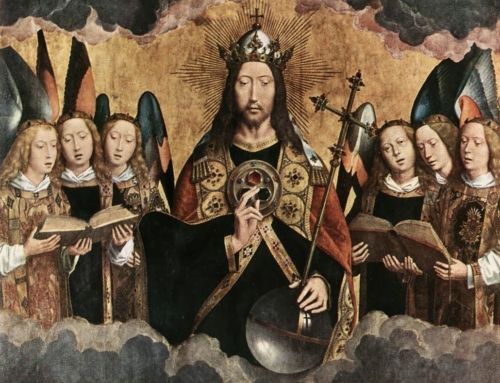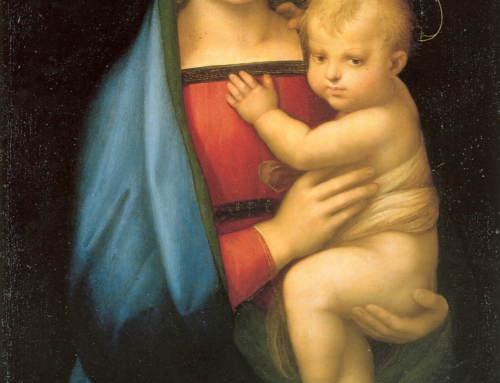Today we celebrate the memorial of Pope St Leo the Great who died in the year 461. Famous for persuading Atilla the Hun from sacking Rome, he is also a Doctor of the Church for his writings–not only on the defense of divinity of Christ (Leo’s Tome) but also his stout defense of the faith against the heresies of Pelagianism and Manicheanism.
He matters today because these two heresies are still with us –and always will be because they are the two errors that we most easily fall into. They are interdependent and together terribly destructive of real, authentic, vibrant faith.
Pelagianism can be broadly defined as “salvation by works”. Of course the full history and theology behind Pelagianism is more complex. Dig into it here if you are interested. At the root, Pelagianism says, “Human beings are good. Their own will is untainted and they have the power to earn their salvation through their willed goodness. The popular form of this is seen if you go down the street and put a microphone in most anyone’s face and ask what they need to do to get to heaven. Invariably the answer will be, “You have to be good enough.”
This idea that you have to be good enough to get into heaven is not held only by the unchurched and ignorant, but ask most anyone in the pews of most any church–both Protestant and Catholic–and I’ll bet a good 85% of them will reply, “By being good enough.”
This is a heresy because it is not through our good works that we are saved, but through faith in the saving work of Jesus Christ on the Cross. Jesus is the way, and it is only through faith in his goodness that we can make our way to heaven. It is by grace, through faith that we are saved.
Another way Pelagianism rules in our world today is the evidence of so many people who are trying, in a multitude of ways, to be good enough. Through their good works, their good connections, their good manners, their good grades, their good looks they rely on the underlying belief that somehow or other they have to be good enough. This is contrary to the Christian religion. The Christian faith consists of realizing, I am not good enough and never can be without Christ’s goodness infused into me.
This doesn’t mean we fall into the other Calvinistic heresy of total depravity. That heresy teaches that our goodness, our free will is totally obliterated by the fall of mankind and original sin. No. God created us good. We retain an intrinsic goodness that cannot be wiped out, but that goodness is stained and wounded by original sin. We need restoration, redemption and healing.
The second heresy that Leo fought was Manichaeanism. Put simply, this is the dualistic idea that the physical world is bad and the spiritual world is good. In popular form today Manichaeanism is there when a person claims that they are “spiritual but not religious.” Did you see what they did there? They believe the “spiritual” (whatever that is) is superior to the blood and guts, nuts and bolts realities of religion. Manichaeanism is prevalent in the assumptions of most New Age practices and spiritualities as well as the religions of the East.
See how these two heresies are interlinked: A person wants to be good enough to get to heaven–and what is heaven? Why it is the “spiritual realm” and that must be superior to this physical realm right? So to be good enough they embark not only on a regime of good works, but also an an attempt to be spiritual and not religious.
What is the answer to Manichaeanism? It is the sacramental system. Through the sacraments (by virtue of the incarnation) the physical world becomes the vessel of the spiritual realm. We do not enter into the spiritual realm by denying or rising above the physical realm, but because God himself took human flesh of his blessed Mother we participate in the spiritual realm through the physical within the focus of the sacramental system.
It is only the Catholic faith in its fullness which holds these things in tension and sees the truth fulfilled and these two heresies quashed.
Finally, why are these heresies dangerous? Firstly, because if you think you can be good enough to get to heaven it is almost impossible to believe that you are not well on your way–and as soon as you believe yourself to be good you fall into the trap of self righteousness. We see this all around us in our society. It is crowded with self righteous people–people who think they’re good, and if they think they’re good they’re proud and worse than that these “good” people must (if they are good) do something about the evil in the world. They must get rid of the evil and the way to get rid of he evil is to get rid of he people who do evil. See where this goes? Not to a good place. If you’re interested, this dynamic of evil in the world is what I discuss in my book Immortal Combat. If you haven’t read it yet, go here to get a copy.
And why is Manicheanism dangerous? For the same reason that all dualistic heresies are dangerous: because they teach that the physical realm is inferior and if inferior then it doesn’t really matter–and if the physical realm doesn’t really matter it doesn’t matter what I do with the stuff in the physical realm. I can lead a debauched life of sexual immorality if the physical doesn’t matter. I can abuse others, wreck the planet–commit most any crime because it is only the “spiritual” that is important.
Are these end points of heresies present today? Of course they are. Why do we live the way we do in a society of greed, deprivation, lust, violence and destruction? Because we don’t really think what we do with our bodies matters.
The Catholic Church teaches that the physical does matter because it is through the physical (not be escaping it) that we connect with the eternal. In other words, what you do with your body affects your soul (and vice versa)







Well written Fr! However, there’s this one inquiry a Protestant acquaintance posed to me with respect to the role of good works in our salvation. He asks, “If works impact our salvation and standing with God, how do we know if our works are enough? How much works is enough to be saved?”
How do we go about answering his inquiry?
Good works do not impact our salvation. We are saved by grace through faith in Christ’s salvific work. Our good works impact our ultimate sanctification. They are accomplished through our co operation with God’s empowering grace and are used for our purification and completion of our formation into the fullness of Christ’s image in us.
Sure, I understand. Nonetheless, works can go the other way, can’t they? Using human freedom/will to reject saving graces (for e.g., skipping Mass without valid reasons and deliberately engaging in sex outside marriage), would cause one to transition from a state of salvation (or state of grace) back to a state of perdition, wouldn’t it? Since not being in a state of grace means “unsaved”.
Good observation. John Calvin put the paradox this way: “You cannot get to heaven through good works, but you cannot get to heaven without good works.”
Where we and him differ – once saved always saved & the idea that some are predestined to be goats from their conception, nothing could be further from the truth.
Fatalistic convictions breed contagious misery. St Francis de Sales, ora pro nobis.
Indeed